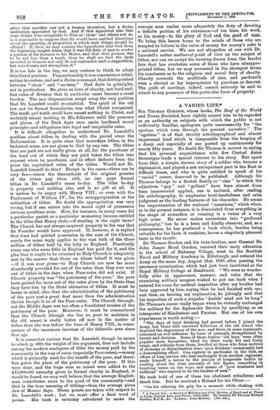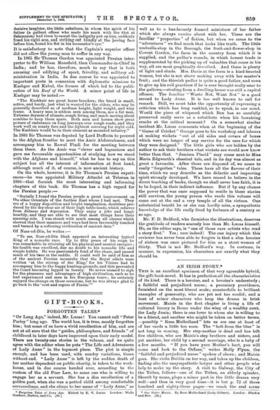A VARIED LIFE.*
Sin Triomes GORDON, whose books, The Roof of the World and Persia Revisited, have rightly caused him to be regarded as an authority on subjects with which the public is not sufficiently familiar, apologises quite unnecessarily for "the egotism which runs through the present narrative." The "egotism" is of that strictly autobiographical and almost impersonal kind which is inseparable from the keeping of a diary, and especially of one posted up continuously for nearly fifty years. No doubt Sir Thomas is correct in saying that his personal acquaintance with five Central Asian Sovereigns lends a special interest to his story. But apart from that, a simple, sincere story of a soldier who became a, diplomatist, and played a not unimportant part in the East in difficult times, and who is quite entitled to speak of his " varied " career, deserved to be published. Although Sir Thomas belongs to a Scotch family or " clan " to which the adjectives "gay" and "gallant" have been almost from time immemorial applied, one is inclined, after reading his autobiography, to emphasise level-headedness and calm judgment as the leading features of his character. He seems the impersonation of the national "canniness," which when, as in the present instance, it is dissociated from everything in the shape of cowardice or cunning is a virtue of a very high order. He never makes excursions into "profound philosophy," but he is a keen and kindly observer, and, as a consequence, he has produced a book which, besides being valuable for the facts it contains, leaves a singularly pleasant taste in the month.
Sir Thomas Gordon and his twin-brother, now General Sir John James Hood Gordon, received their early education in the school of Dalmeny Village, went to the Scottish Naval and Military Academy in Edinburgh, and entered the Army on the same day, August 21st, 1849, after passing the necessary examination, which had just been instituted at the Royal Military College at Sandhurst. "We were so wonder- fully alike in appearance, manner, and voice that the examining military surgeon wished to put me back when I entered his room for medical inspection after my brother had been approved by him, saying that be had finished with me; and then, on hearing my explanation, he jokingly said that his inspection of such a singular ' double ' need not be long." Sir Thomas's career really began when he virtually exchanged the military for the diplomatic Service by qualifying as an interpreter of Hindustani and Persian. But one of his own
experiences is worth noting :—
"The days of hard drinking had passed before I joined the Army, but there still survived followers of the old school who deplored the degeneracy of the new, and these, in some regiments, exercised an evil influence by force of example, strengthened by taunts and derision. Some of these festive 'old boys' were often popular mess favourites, liked for their ready wit and lively songs, and ridicule from them, levelled at those who from motives of economy or disinclination were 'poor drinkers,' occasionally had a demoralising effect. One captain in particular in the 61st, an officer of long service who had exchanged from another regiment, made himself a terror to the juniors of temperate habits by reading aloud the wine accounts of low figure, remarking in taunting terms on the ways and means of 'poor treatnree and milksops' who aspired to be the leaders of men."
He took bold of one of these too abstinent subalterns and shook him. But he received a Roland for his Oliver :— "On his relating his grip for a moment while shaking with • A Varied Life: a Record of Military and Civil Service, of Sport and of Travel in India, Central Asia, and Persia (1849-1902). By General Sir Thomas Edward Gordon, E.C.B., Re. London John Murray. [15.. net.] derisive laughter, the little subaltern, in whom the spirit of his father (a gallant officer who made his mark with the 61st at Salamanca) had risen to resent the indignity put on him, suddenly Ned his Tight arm, and Striking out blindly at the jeering face before him, found his fist in his tormentor's eye."
It is satisfactory to note that the Captain's superior officer did not allow the young man to suffer in any way.
In 1885 Sir 'nomad Gordon was appointed Persian inter- preter to Sir William Mansfield, then Commander-in-Chief in India; and he has, therefore, much to say that is both amusing and edifying of sport, frivolity, and military ad- ministration in India. In due course he was appointed to important posts in connexion with diplomatic missions to Kashgar and Kabul, the former of which led to the publi- cation of his Roof of the World. A minor point of life in Kashgar may be noted :—
"The Kashkais are great horse breeders ; the breed is small, active, and hardy, just what is wanted for the riders, who may be generally described as of medium height, light weight, and wiry frame. A heavy man is seldom seen among them, nor a fat man. Extreme dryness of climate, rough living, and much moving about combine to keep them spare. Both men and horses show great powers of endurance on long journeys over rough roads, and they work well on scanty fare and the lightest covering for night cold. The Kashkais would be in their element as mounted infantry."
In 1885 Sir Thomas was deputed by Lord Dufferin to proceed to the Afghan frontier to meet the Amir Abdurrahman, and accompany him to Rawul Pindi for the meeting between them there. As the Amir was " clever and loquacious and gave me favourable opportunities of studying how we stood with the Afghans and himself," what he has to say on this subject has all the interest of information at first hand, although much of it, of course, is now ancient history.
On the whole, however, it is Sir Thomas's Persian experi- ences—he was appointed Military Attaché at Teheran in 1888—that furnish the most interesting and informing chapters of this book. Sir Thomas has a high regard for the Persian people :—
"Socially I found the Persian people a great improvement on the other Orientals of the further East whom I had met. They are of a happy disposition and bright imagination, doubtless pro- duced by the dry clear air of their high table-lands, which relieves from dulness and depression. They enjoy a joke and laugh heartily, and they are able to see that most things have their amusing side. I was struck with much among all classes which showed that their manners and ways had been favourably touched and turned by a softening civilisation of ancient date."
Of Nasr-ed-Din, he writes :- "To me, Nasr-ed-Din Shah appeared an interesting typical Ring of a nomadic race. Up to fifty years of his reign he was remarkable in retaining all his physical and mental energies ; his health was excellent, due no doubt to his nomadic life and simple habits. He was passionately fond of the chase, and passed much of his tine in the saddle. It could well be said of him as of the ancient Persian monarchs that the Royal edicts were written at the stirrup of the King,' for his Viziers had to accompany him to the happy hunting-grounds, and this prevented the Court becoming lapped in luxury. He never seemed to sigh for the pleasures and advantages of high civilization, such as he had experienced and seen in his European tours ; he certainly enjoyed the change on those occasions, but he was always glad to go back to the rest and repose of Persia."































































 Previous page
Previous page